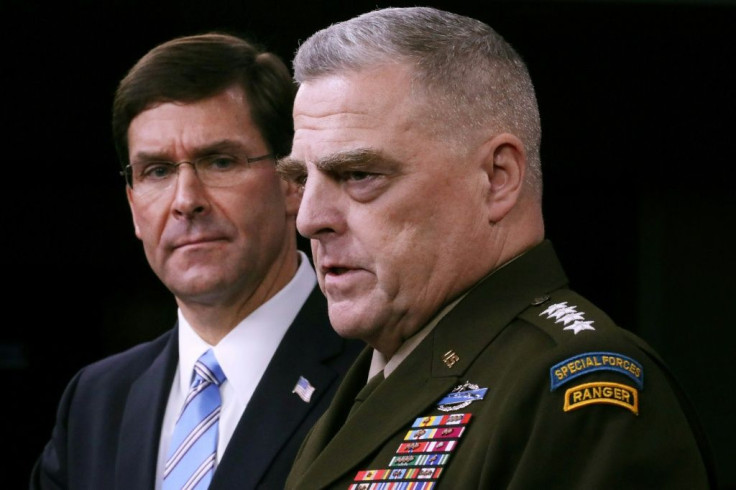US Letter On Iraq Military Withdrawal A 'Mistake', Pentagon Says Troops Will Stay

KEY POINTS
- There is confusion regarding the authenticity of a letter informing the Iraqi government that coalition troops are pulling-out of Iraq
- Gen. Mark Milley, Chairman of the Joint Chiefs of Staff, called the letter "a mistake"
- Secretary of Defense Mark Esper said the letter is inconsistent with realities on the ground
The Pentagon is rejecting the contents of a letter leaked to the press claiming U.S.-led coalition troops will leave Iraq as demanded by the Iraqi parliament on Sunday.
The unsigned letter delivered to the Iraqi ministry of defense was ostensibly written by U.S. Marine Corps Brig. Gen. William Seely III, a former director of Marine Corps Intelligence who is now director of the Iraqi joint operations task force.
The letter, whose veracity is in question, informed the Iraqi government the U.S. will be "repositioning forces over the coming days and weeks to prepare for onward movement." It said the operation involves several hundred coalition and NATO troops being re-deployed from the main military base in Baghdad's secure Green Zone. It noted the withdrawal was occurring “in due difference to the sovereignty of the Republic of Iraq, and as requested” by prime minister Adel Abdul Mahdi and the Iraqi parliament.
"In order to conduct this task, Coalition Forces are required to take certain measures to ensure the movement out of Iraq is conducted in a safe and efficient manner," the letter added.
This coalition memo appears to be genuine - but also misleading and badly phrased. Am told by coalition source that it’s to let #Iraq know that US is moving troops out of Green Zone to provide Force Protection elsewhere. NOT leaving #Iraq pic.twitter.com/Erpid6ct6E
— Jonathan Beale (@bealejonathan) January 6, 2020
The Pentagon later said the letter informing the defense ministry U.S.-led coalition troops will leave Iraq “was a mistake,” and was only a draft letter. Instead, it insisted coalition troops will remain inside Iraq.
“That letter is a draft, it was a mistake, it was unsigned, it should never have been released,” said Gen. Mark Milley, Chairman of the Joint Chiefs of Staff, a few hours after the letter was published by several U.S. media outlets.
“Poorly worded, implies withdrawal,” said Gen. Milley. “That is not what’s happening."
Secretary of Defense Mark Esper echoed Gen. Milley's comments. He also said he's unable to comment about the veracity of the letter, how the letter was made public, or who directed it to be drafted.
“Beyond that with regard to the letter, which I’ve read once, I can’t tell you the veracity of that letter,” said Esper. “That letter is inconsistent of where we are right now.”
The Pentagon supported both Esper and Gen. Milley.
“There has been no change in U.S. policy with regard to our force presence in Iraq," said Alyssa Farah, Pentagon press secretary. “We continue to consult with the Iraqi government regarding the defeat-ISIS mission and efforts to support the Iraqi Security Forces. We remain committed to the D-ISIS coalition and ensuring a safe, secure, and prosperous future for the Iraqi people."
There are more than 5,000 U.S. soldiers deployed throughout Iraq helping to fight the remnants of ISIS. U.S. military officials earlier said they're putting a stop to coalition anti-ISIS operations to prepare for any Iranian retaliation stemming from the assassination of major general Qasem Soleimani on Trump's orders.
On Sunday, Iraqi lawmakers passed a resolution calling for all foreign troops to leave Iraq. Parliament's vote, which saw the abstention of Kurdish and Sunni politicians, is largely symbolic and sets no timetable for withdrawal. It is, however, subject to approval from the prime minister.

© Copyright IBTimes 2024. All rights reserved.





















